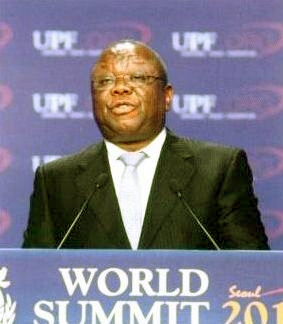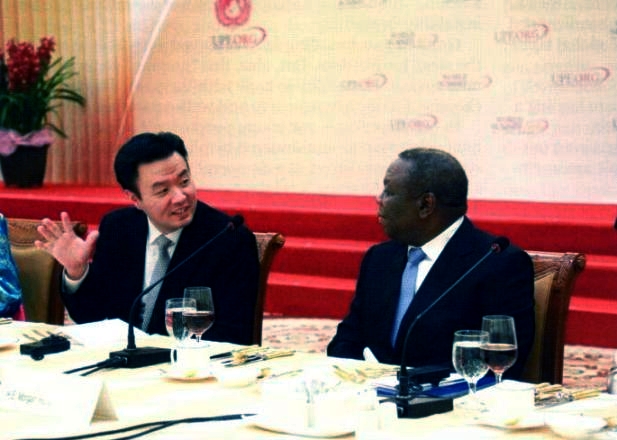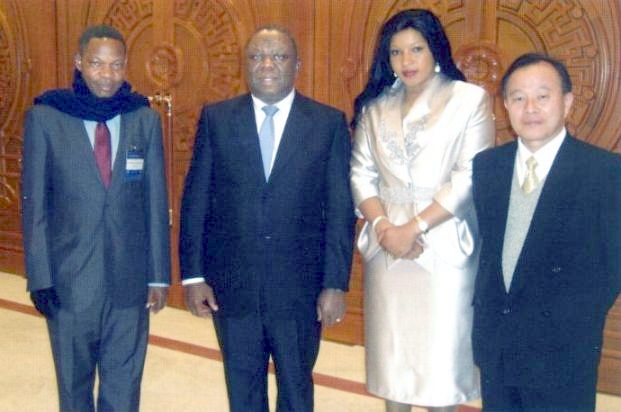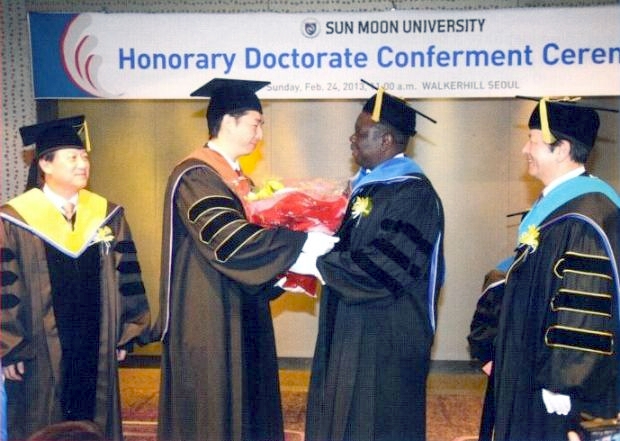![]()
The Words of the Tsvangirai Family
|
|
The Words of the Tsvangirai Family |

Prime
Minister Tsvangirai giving his presentation, on February 23, 2013 in
Seoul.
In 2010 and 2011, FFWPU-Zimbabwe received donations of As a Peace-Loving Global Citizen, which National Leader lyolangomo and other members distributed to government and academic figures. At least in part, the Zimbabwean premier attended UPF World Summit 2013 as a result of having read True Father's autobiography.
The occasion offers me an opportunity to share our people's reflections, insights and, o tender, our recommendations to the global stage on the critical issues we face as a nation, and as a region within our family of nations. To us in Africa, in particular southern Africa, the end of the cold war exposed deep institutional weaknesses that posed serious dangers to the development of a democratic culture, policy cohesion, national development and sustainable peace.
These limitations often made it impossible to address fundamental imperatives for security and national development through integrated policies and programs.
While we accept that past historical practices blurred the creation of a compelling national vision and were unkind to broad-based democratic aspirations, equally culpable were our founding generations who seemed so overwhelmed by parochial demands that they failed to move out of the box in order to chart new paths for development.
It remains an important milestone of humanity that the people registered tremendous gains by attaining freedom and independence from colonialism. But the numerous challenges our young nations faced at the time made it difficult for them to cast away the contagion of the past.
As a result, the cross-cutting and overlapping agenda for lasting peace and sustainable development as a mechanism for conflict prevention, conflict management and post-conflict reconstruction was never accorded the necessary space in a fast-changing world order, leading to Afro-pessimism; despondency and despair; and a loss in hope for much of Africa.
Today a comprehensive normative framework, born out of the appreciation of the centrality of extended freedom and the need for open societies, has begun to take shape, making human security a major factor of stability, economic growth and good governance.

In
Sup nim in conversation with Prime Minister Tsvangirai at a special
banquet True Mother hosted at the Cheon Jeong Peace Palace for
special guests from UPF World Summit 2013
More than thirty African states -- from Cape to Cairo; Mombasa to Monrovia -- have embraced a new thinking that puts people first in their national agenda. These countries, under the guidance of young leaders, are steering the continent toward a positive era of Afro-optimism.
There is a realization of the continent's potential for growth underpinned by a dormant resource base which when fully exploited can easily shift the economic power balance in Africa's favor.
Further, it is beyond doubt that constitutionalism -- in particular the sanctity of the rule of law -- is fast gaining currency as the basic benchmark for an emerging value system in all normal societies. Military interference in politics is no longer celebrated. The political terror scale and all motivations for violence are fast losing their place as the people redefine their priorities and embrace new cultures.
What this means is that Africa, drawing from the lessons of the past, is undergoing a major political metamorphosis meant to propel the continent into a new epoch.
Demands for democratic culture are sweeping across the continent and opening this previously sleeping giant into a promising destination for business and leisure and a center for global attention.
In this transformative stage, Zimbabwe is among the most recent beneficiaries of the changing African mind-set, having negotiated itself, with the help of SADC (Southern African Development Community) and the African Union, out of a failed state status through radical policy interventions that saw the completion of a new draft constitution that is expected to redefine a new value system for the country. May I point out that in this new constitution, we have acknowledged the supremacy of the Almighty God, recognizing that we, as humans cannot do it by our own strength.
Today, a new constitution is currently up for public analysis and scrutiny. This charter, as a covenant, promises to open the way for a democratic election, leading to a new dispensation, in a new Zimbabwe.
I must emphasize that for the first time in our history, we fully recognized the role of women in our society. The charter, which identifies Zimbabwe as a noteworthy player among other nations, accepts gender equality and inclusive human security as necessary constitutional safety nets in line with universal norms and standards. Precarious Times for Zimbabwe
However, even with these tentative steps toward a new culture of constitutionalism, Zimbabwe is a country that is still at risk. As we approach another election period this year; we seek to put in place institutions, legislation, and mechanisms that will deal with the generic inhibitions of patriarchy and other negative social constructions that breed instability and can lead to violence. We are mindful of the fact that Zimbabwe's elections over the past decade have been marked by bloodshed, with women being the primary victims.
We believe our future political responses, in line with international best practice, shall grant us our space as a civilized player within the family of nations. We are desirous of laying the foundations through this new constitution of a "never again" mind-set.
Having avoided a total collapse of Zimbabwe, our priorities are clear. We must build strong institutions and other political "fire- walls" to circumvent a relapse.
2013 offers us, SADC and Africa a defining moment for Zimbabwe. We must accept the imperative and manage the final stretch with care and maturity in order to insulate our people from decades of political uncertainty.
As we prepare for an election, the world must continue to nudge us to be open about this transformative process, to be accountable to humanity, to embrace tolerance and to allow the will of the people to prevail.
What confronts us requires global attention if Zimbabwe is to move away from dinner-table discussions, where it has been dominant, clearly for wrong reasons, for the past few years.

From
left: Bosako lyolangomo, the Zimbabwean national leader, Prime
Minister Tsvangirai and his wife Elizabeth, and early missionary to
Africa, Sasada Toshiaki
Instability in any part of Africa or elsewhere, no matter how narrow and parochial, can easily spawn litters and a surfeit of challenges.
From our experience in SADC, growth, convergence and regional solidity became the first casualties of the Zimbabwean crisis of governance.
The crisis short-changed ordinary people, retarded our economic competitiveness and soiled our regional image in the eyes of potential development partners.
Without peace, security, and human development, Africa's role in shaping the international agenda remains handicapped at a time when the demand for entry into a single global family within the continent is rising every day.
I come from a region where millions -- and, in Zimbabwe's case, four out of five young people under thirty -- are leading a "semi-nomadic" life, desperately in search for work.
The continental average is even more worrying: seven out of ten highly educated and ambitious young people are unemployed, the bulk of them women.
Tension and negative energies always thrive in uneven circumstances. To avoid such political depressions, we must redefine the allotment of power in our societies to make way for growing concerns of these young women and men.
I am very concerned about the presence of hordes of active young people roaming the streets without hope for a decent future.
The dilemma is that this is either an untapped resource or a ticking "time-bomb"; an opportunity or a source of political instability-in-waiting.
Granted, our founding fathers played a key role in setting the stage for freedom. But, alas, this "greying" generation must accept its inability to cope with the pace, demands, and choices of today's hyperactive and well-networked children.
In this digital age, our young people have a shared, common value system -- unhindered by physical boundaries. That system can only thrive in a democracy; that system believes in a common humanity; it celebrates openness and transparency.
The new generation can easily "crowd-source" solutions out of a global social or economic upheaval. This group has the ability to organize itself quickly, outside traditional bureaucracies or formal conferences and meetings.
Investing in young people must be our starting point. They are different: their appetite for participation, dignity and opportunity; for choice and for time and space is both insatiable and non-negotiable.
In the case of Zimbabwe, and indeed the rest of Africa, lack of openness and inclusion seem to have been our perennial nemesis.
The society we wish to build shall be based on a raised institutional performance level and secured by infrastructural excellence. A sound infrastructure can lay a solid base for a rapid economic turn-around and absorb millions of highly educated but unemployed young people inside our homes. Poverty and unemployment have been a prime source of instability and must be contained as a matter of urgency, otherwise peace, security and human development can never be realized.
Zimbabweans yearn for the day when the state ceases to be a source of political volatility -- confining itself to an enabler rather than a first choice player in the conduct of ordinary people's lives. Africans have languished for so long under the shadow of the state, often unnecessarily. This has eroded confidence and affected institutional transformation initiatives.
With strong, people-driven institutions to protect democracy, I believe sufficient safeguards can be assured around citizen security, peace, and justice together with other aspirations of Africans in fragile communities.
The turn-around period, in my view, can be as short as a single generation if we contain the usual negatives which often derail transformation and reform in emerging societies.
These include corruption and other initial post-conflict residue, like weak governance structures and poverty. At the core of our policy thrust lies fairness, inclusion and diversity in all aspects of economic, social and political activities and life.
Zimbabwe is today standing at the crossroad. Your solidarity with us as we pull down the years of inequity and injustice will help us to achieve real sustainable peace where every Zimbabwean man, woman and child, cannot only be secure, but also enabled to live the life that God ordained for them. With your help we can achieve that society.

Zimbabwean
Prime Minister Morgan R. Tsvangirai receiving his Sun Moon University
honorary doctorate from Kook Jin nim. Dr. Sun Jo Hwang, the president
of Sun Moon University is at right.
Ladies and Gentlemen, Sun Moon University does me a great honor in con- erring upon me this honorary doctorate. It therefore gives me great pleasure to be the recipient of this honorary degree.
I accept this honorary degree as a great honor, not only for me, but for the entirety of the people of Zimbabwe as well.
To be the person that I am today is not simply down to luck or individual effort but it is because of the people around me. Where I come from, we live by the basic ideal of Ubuntu or Hunhu, which essentially says, "I am because you are." It is a basic principle which encapsulates the African spirit that one's humanity is inextricably connected to the other's humanity. It is the foundational principle of building a decent society and confirms the dignity and worth of every human being, regardless of their station in life.
Without the work and efforts of the people of Zimbabwe, I would not be standing here, awaiting receipt of this prestigious honor. This recognition is therefore their award -- indeed, our award, and I am a mere agent receiving it on their behalf.
As a national leader in Zimbabwe as well as the leader of a democratic movement and the largest political party in the country, I indeed feel deeply honored by this great recognition and reception you have given me today.
As a country, we have seen our fair share of challenges during the course of our history. For more than a decade, the beautiful name of our country became soiled and has been in the news for the wrong reasons. I must pay tribute to the people of Zimbabwe, who have been patient, resilient and persistent in their pursuit of the good cause of democratic governance.
Words cannot express enough of my personal gratitude to the people of Zimbabwe who have stood by me and the party that I lead, the Movement for Democratic Change, through years of great challenges.
We have stood steadfast by our principle to pursue our cause of democratic reform through peaceful and non-violent means.
Where others in similar circumstances might have been forced to use forceful means and violence, we have remained true to our word, believing that peaceful means are the ultimate agents of sustainable transformation.
I mention this because I know that one of the great values of this university is peace. In preaching and spreading the gospel of peace, the founding father of this University and of the Universal Peace Federation, Dr. Sun Myung Moon, left a great legacy for the world.
In Zimbabwe, we are in the final stages of writing a new constitution, which, we hope, will shape and transform the political culture of our country. It has taken long to achieve this goal but we are pleased that we have managed to persuade even our political opponents that constitutional reform is critical to the democratization and development of our country.
We believe, through this new covenant between the political leaders and the people of Zimbabwe, that where there was lawlessness, there will be the rule of law and that where there was violence, there will be peace.
We hope to move away from a culture of impunity to a culture of constitutionalism; where political leaders, institutions and governmental power are limited by law; indeed, where the fundamental rights and freedoms of the people are respected and protected.
I have read and understand the founding ideal of Sun Moon University to be "Love for God, People and Nation."
I understand that this ideal is the foundation for the ultimate goals of education in Korea, namely, to construct one's character, to raise the quality of the democratic citizen, to pursue a humane life, to contribute to developing a democratic country and to realize ideals of human prosperity.
I find this ideal hugely inspirational. To say, "Love God, Love Humanity and Love Your Country" is to inspire people to build a culture of service to humanity and to the Almighty. I wish to carry these words back to Zimbabwe, for they carry great wisdom that will inspire us as we begin the work of rejuvenating our country after years of political, social and economic challenges.
We have already made it clear in our new constitution, that not only the state but every person, including corporate institutions must promote national unity, peace and stability.
The state is also required to take all practical measures to protect the fundamental rights and freedoms of the people. Citizens have a duty to be loyal to the country and to observe and respect the constitution and its ideals.
For the first time in our history, in addition to civil and political rights, the socio-economic rights are protected under the constitution. These include the rights to education, health care, shelter, safe environment, food and water. We recognize these rights because their realization protects and enhances basic human dignity, which is fundamental for the happiness of individuals and society at large.
We aspire to build a society in which the basic ideal and objective of public administration is to selflessly serve the people. We want to raise children who appreciate the goodness of service to the public and to the nation; people who appreciate that in all their endeavors, what is fundamental is to give more to others as opposed to merely expecting more and more from others.
I believe most sincerely, that power should not be individualized but rather, that power should be institutionalized. Only when we create credible and responsible institutions can we cultivate a culture of good governance and accountability.
This is why we have ensured that the new constitution articulates the principle of separation of powers and checks and balances between arms of the state and its institutions. It also explains why we have an entire chapter dedicated to principles of public administration and leadership.
Finally, I am most humbled by the honor that has been bestowed upon me and the people of Zimbabwe. I come from a society which places high value on education and naturally, I am pleased when my own work to serve the country and its people is recognized by institutions of higher learning in countries around the world. It gives us hope that our efforts as a people are not in vain.
Such recognition says to us that the entire universe is conspiring to assist us in the realization of our destiny. I am grateful to the people of Korea for their kindness and support shown through the conferment of this honor.
I remain greatly inspired by people like Reverend Sun Myung Moon, whose work and life across continents continue to impact positively on the lives of millions of others in the world.
Once again, I am most humbled by the gesture that has been shown to me and to the people of Zimbabwe by the award of this prestigious honor. I thank you.